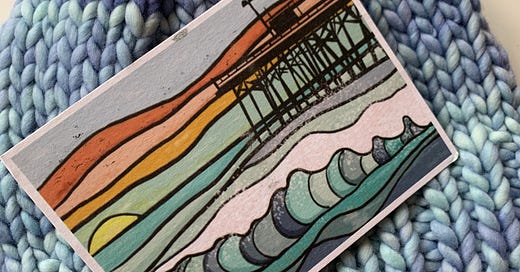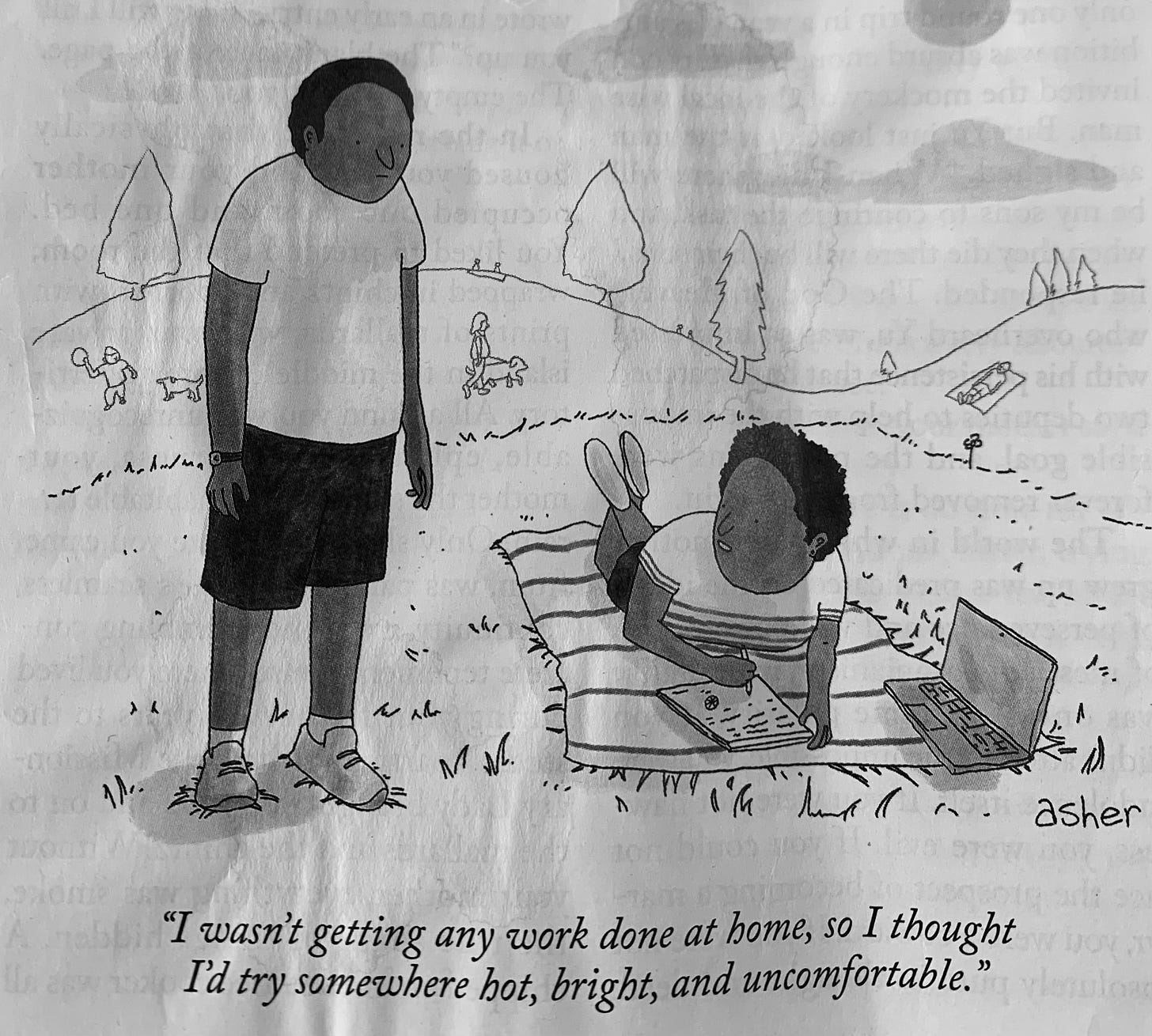These days, it's hard to be someone who writes about trauma. I'm not in the US but even in Berlin I feel the deadened mood. Writing has always been a way of working through my feelings, of trying to understand the slippery or ugly. So I’ve been writing. Thoughts on an aspect of the Gisèle Pelicot case. Some words about how it feels to have a convicted rapist making plans to run the country. An idea about how our culture and systems influence how we see healing.
But this doesn’t feel like a good time for any of that.
Not that there is ever a right time. I've been writing about abuse for almost fifteen years. That kind of writing often floods into silent eddies, circling but seldom banking. I get it, though. It is hard to "love" a post that pierces tender points. Or one that you worry someone would associate with you, if you were to share it. So instead I'm going to offer three small ideas that are sustaining me these days. I'd love to hear what is juicing you up, in the comments, if you feel inclined.
Sending Mail.
I've sent close to fifty postcards and letters since I've been in Berlin. If you've received one then you know a terrible truth: my handwriting is awful. But while I want you to be able to parse out my words, more than that I want you to know you were on my mind.
Postcard, greeting card or old-fashioned lined paper, correspondence sent through the mail is rare these days. But it hasn't always been that way. André Leon Talley and Karl Lagerfeld wrote long letters, each on personalized letterhead, back and forth about fashion and French history. Georgia O'Keefe and Alfred Steiglitz sent 25,000 pieces of paper between them over the course of three decades. Pauli Murray and Eleanor Roosevelt were longtime correspondents about race in America including segregation and what FDR might be willing to do. Writing to a chum (or lover) strengthens a relationship.
Maybe you remember the glee you felt as a kid when you received a birthday card with $10 in the mail from your grandparents. That delight can be felt again in hearing back from people who've received them. "I never get real mail!" more than one of you told me. A card sent through the mail is a set of binoculars handed over, "here, come see what I've been up to." You are invited in. I love that feeling. Maybe you might to?
Making Art. If you're tempted to skip this one because you aren't an artist, stay with me a minute.
"Everyone has stories that the rest of us can learn from," Sarah Kay says in her TED Talk on the art of spoken word poetry. But of course our art doesn't have to be shared. What matters is that we make it.
Art is a way we unfurl our hand to this life. Instead of being either unfazed, frantic or melancholy, we can feel something softer. Awe, joy, pride, and yes even accomplishment. (The very best kind...one by you, for you.) We can feel these delights by painting|upholstering|baking|crocheting|playing that piece that only we can. This catalyst to release the clench is especially useful for abuse survivors who've been trained to distrust. Making art is a gamble but the risk we take is on ourself. And that's one of the simplest ways to build trust.
Sarah Kay teaches others how to get into spoken word poetry with an easy tool. A tool, in fact, that I used many moons ago with coaching clients: make a list. So, if making art feels daunting or inaccessible, you could start there. Maybe your list is: "types of magazines (or stores / museums / music) I'm drawn to". Or "I've always wanted to _____". Then choose something that gnaws at you and start to dream how it could happen. Maybe it's buying the fabric or asking on your neighborhood list serve for green glass. Starting somewhere is a start.
Taking Rest.
I will rest after. . .
working out
walking the dog
re-ordering the prescription
meal prepping
drop off of school
making a list for the dogsitter, committee members, partner, kid(s)
unloading the dishwasher
folding laundry
grocery shopping
dentist/gyno/chiro/therapist/pediatrician appointment
reserving a table for birthday dinner
finding birthday present
wrapping birthday present
sending one last email.
Our tasks (not to mention our “real work”) never end, though. One chore finishes, another clicks into place. "After" is a mirage.
I come to rest with great reluctance, groomed in the crisp uniform of hard worker. Diligence and competence have been my daily bath water. As a rape survivor, I also carry the memory of past powerlessness and internal alert to stay busy. How can I lay my head down, outside the scope of bedtime, for even twenty minutes?
But in the past nine months, I've started to believe in taking rest. Part of this comes from Tricia Hersey of The Nap Ministry whose revolutionary work I’ve followed for years. Another part is the grasping hand of hormonal fatigue that can quash an unsuspecting day. Fine, I guess, because stores close here on Sunday anyway. That's not an aberration. Germans rest. The average citizen receives six weeks vacation annually and can take as many sick days as needed. Regular people catnap on park benches. They close their eyes on the SBahn. This is how my husband grew up. He is a napper and avid encourager of me taking rest. With rest, my productivity goblin grows more quiet. Temporary (?) but still a relief.
If art is a reclaiming, then rest is a hush. I crave the hush so I can hear myself think. Think as Elizabeth, not mother|worker|partner. When I think as Elizabeth, I reconnect to my creativity. I remember old stories and forgotten scents. I remember who I once was and What I Wanted Once. Like connection and art, those elements matter more than ever. So, rest.
I'd love to hear what is juicing you up, in the comments, if you feel inclined.
What I just finished reading:
Novel. Valley of The Dolls by Jacqueline Susann. A reread but I saw a cover I’d coveted so I jumped. Camp, definitely cringe but wickedly delightful, Valley was Susann’s first book (1966) and it ranks as one of the bestselling novels of all time. Who knew? Think Peyton Place, just city not country, more pills and less sex.
Essays.The White Album by Joan Didion. If Valley of the Dolls’ soundtrack is this, The White Album is this. Truthfully, I struggle with Didion. I admire how spare she is -there is never an extra word - but her coolness sometimes leaves me wanting. My favorites here: The White Album, Many Mansions, In Bed, In The Islands.
Memoir. Bone Black by bell hooks. Bone Black was recently published for the first time in the UK so it’s been spotlighted in a few bookshops around here. hooks’ story is about herself as a Black girl in born into a family that had neither the time or inclination to know her. It’s poignant, accessible and relatable. <3
Novel. Ethan Frome by Edith Wharton. I recently finished the generous and practical How To Write An Autobiographical Novel by
. In it, Chee recounts some writing advice from Annie Dillard. Wharton is mentioned. I went looking for Ethan Frome. Glad I did! This 1911 novella is ripe for a fresh look. You’ve been in at least one serious relationship since you read it in middle school so use that as a lens if you pick up Ethan Frome.
Recommended Links:
Aside from looking at who won the National Book Awards this year (Percival Everett’s James —snark ahead—beating out All Fours...yesss ), I’ve been on hiatus from the news. So here’s a roundup of timeless goodness:
Coffee and hot cocoa lovers alike will appreciate this NYT piece about a cheerful barista at Grand Central Station.
Dogs in shower caps going from Street Life to Sweet Life? Yes, please.
I’m on an Ada Limón kick so here she is reading The Quiet Machine.
Need a little Disney? Here’s Ayn Rand reviewing her faves.
If you like anything above this line, please click the ❤️ below. Thank you for being here and stay well, friend.






Great reads! I loved Valley of the Dolls when I read it as a teenager.